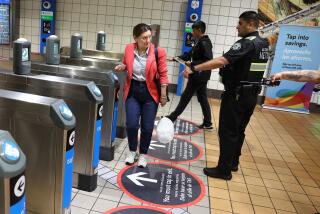A Good Deal for Somebody: $50 Million for 10 Toilets
- Share via
Only the MTA or the guys who sold Manhattan would think this is a deal:
The transit agency’s board voted Thursday to give a billboard company the rights to as much as $50 million in outdoor advertising space for 10 years in exchange for 10 toilets.
Of course, the MTA also will get 10% of the revenue from the new billboards, plus an additional amount in fees, some ad space and radio air time, so the toilets--high-tech and self-cleaning, no less--aren’t really as expensive as they might seem: somewhere between $4 million and $5 million a pop.
Although the outline of the toilets-for-billboards contract was approved last year, directors of the Metropolitan Transportation Authority on Thursday gave the project its green light.
Over the vehement objections of two competing billboard companies and sharp criticism from one of its own members, the board approved an environmental document that says the billboards’ negative impact can be offset.
The MTA board also agreed not to try to preempt local governments from enforcing their own ordinances controlling billboards when cities and the county consider issuing the permits needed to erect the new advertising structures.
Los Angeles City Councilman Hal Bernson objected to the entire package, calling it “one of the most ridiculously one-sided contracts that has been perpetrated,” since the Dutch bought Manhattan Island from Native Americans in 1626 for $24 worth of beads, cloth and trinkets. Bernson said the MTA had given up millions of dollars in revenue to get the automated toilets--the first on its nearly 60 miles of subway and light-rail lines. “We have done it again,” he said. “We look stupid.”
The councilman did not vote on the environmental document for the toilet-for-billboards deal because of a conflict of interest. But the MTA board approved the document, called a negative declaration, on an 8-0 vote with one abstention.
Opponents of the deal with STI Outdoor made an unsuccessful last-ditch attempt to block the approval. Attorney Ben Reznik, representing a competing billboard company, Eller Media, called the MTA contract “a horrible deal.” He estimated the agreement could generate as much as $150 million worth of advertising rights during the first 10 years in exchange for the 10 automated toilets.
Reznik said “something is drastically wrong” with the process of awarding the contract because other advertising companies did not know the billboard sites on MTA property would include valuable locations along freeways where far more people would see them each day.
Juan D. Levy, manager of STI Outdoor, said the competitors’ protests were “sour grapes” because they chose not to bid. “They are trying desperately to impugn the process, the project,” he said. “They are making outrageous statements.
Levy, who has been working on the project for more than 2 1/2 years, said it was obvious when the MTA sought proposals that freeway locations were possible sites for new billboards. “All of [MTA’s] right of way was fair game,” he said.
He rejected as far too high the revenue estimates offered by Eller Media. “There is no way to put a number to that” without knowing the locations where new billboards are allowed, he said. “I hate putting a number out there. It’s really not a prudent thing to do.”
But using an MTA figure from March 1999, Levy estimated that the advertising revenues could be between $40 million and $50 million over 10 years. From that, STI would have to pay its own costs, plus provide MTA with more than $1 million in free radio time, $750,000 in fees, plus 5% of the advertising space for transit agency use as well as 10% of remaining revenues.
Levy said the toilets-for-billboards deal will benefit MTA passengers. “Unless there is a system like this in place, people will have no toilets,” he said.
Because of security concerns, there are no public restrooms on MTA’s rail system. Most of the 10 toilets would be placed at rail stations or major bus transfer points. The free-standing toilet structures, similar to toilets in use in San Francisco, San Jose and Palo Alto, cost about $250,000 to install and about $100,000 a year to maintain, Levy said.
He said the pact will provide long-term funding and maintenance for the public toilets without tapping MTA’s operating budget or affecting its future transit projects.
Los Angeles County Supervisor Yvonne Brathwaite Burke, chairwoman of the MTA board, recalled that the agency was under tremendous pressure to provide toilet facilities when it first considered the arrangement. Since then, Burke said, the issue has “grown beyond anything we had possibly imagined.”
More to Read
Sign up for Essential California
The most important California stories and recommendations in your inbox every morning.
You may occasionally receive promotional content from the Los Angeles Times.













